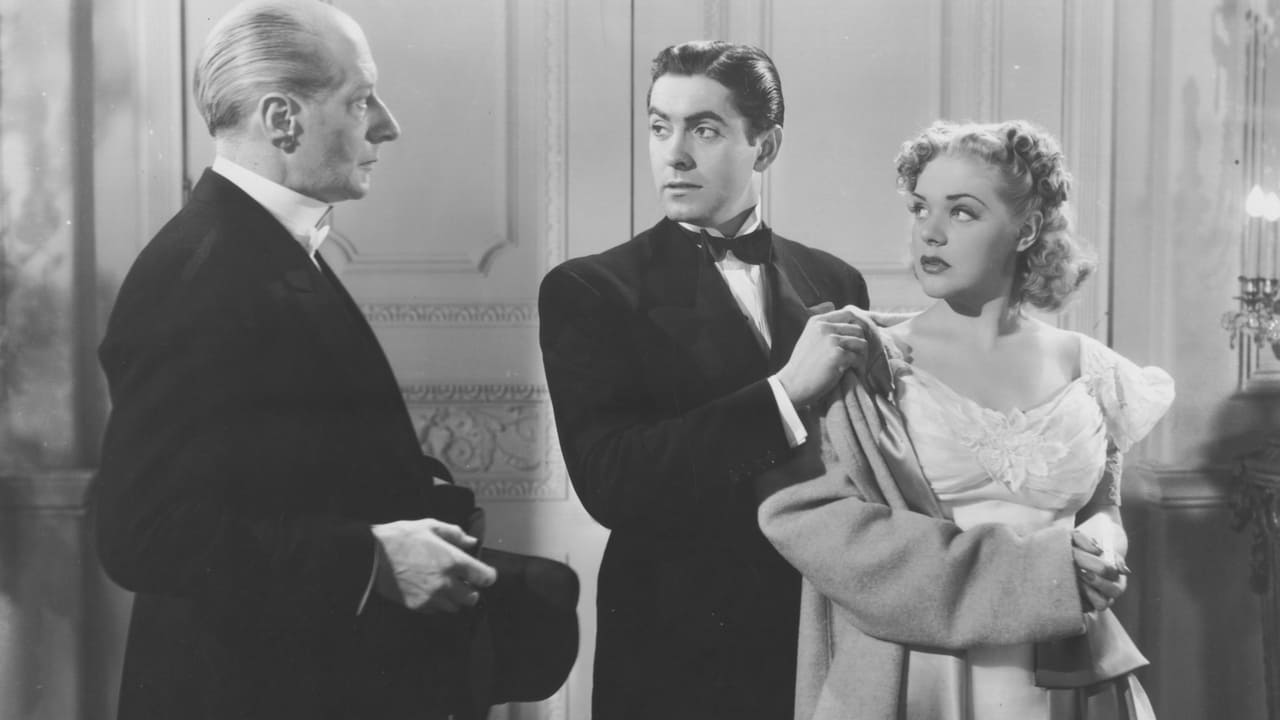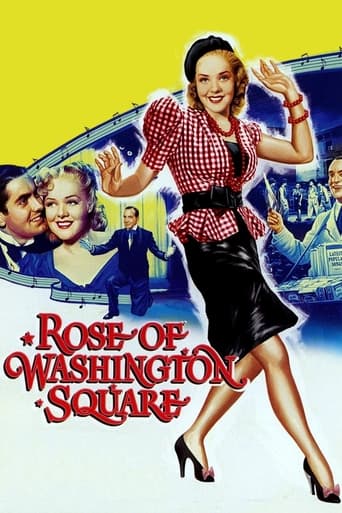Tetrady
not as good as all the hype
TrueHello
Fun premise, good actors, bad writing. This film seemed to have potential at the beginning but it quickly devolves into a trite action film. Ultimately it's very boring.
Rio Hayward
All of these films share one commonality, that being a kind of emotional center that humanizes a cast of monsters.
Allissa
.Like the great film, it's made with a great deal of visible affection both in front of and behind the camera.
vincentlynch-moonoi
It's almost as if you have two separate movies here. There's Rose of Washington Square and her love affair...and there's Al Jolson reaching for the top of Broadway. The two stories do come together, but they almost seem like separate plots.The great thing about this film is that you see Al Jolson singing a few of his greatest hits...although he's not playing himself...sort of. The good news is that Jolson is in particularly fine voice here. More mellow and with a lower key than his early 78s, but clearer and purer than the Jolson on his recordings of a decade later, around the time of his bio-pics. The bad news is, ironically, that the father of sound films is a pretty stiff and lousy actor. Twentieth Century Fox thought so, too. This was his last starring role! And then you have the romance and drama between a Fanny Brice-like character and a Nicky Arnstein-like character. A coincidence? No, Fox just changed the names, and Brice sued them...and settled. But it's all very interesting. I can't say that Alice Faye had the best songs in this film, but she does do "My Man". If there's a problem here with this film it's that you have its other star (Tyrone Power) playing the bad guy...and we so want to like Tyrone Power.There was definitely screen chemistry between Tyrone Power and Alice Faye, but, unfortunately, their two other pairings -- "In Old Chicago" and "Alexander's Ragtime Band" -- are simply more compelling films.This is a film supremely worth watching for the singing performances of Al Jolson; too bad his acting wasn't as good! The drama of Rose...it's okay. Recommended, but it may not end up on your DVD shelf...unless Jolson tempts you!
gkeith_1
Tyrone. So good to look at. I feel that he is much more handsome in this part than the actor who played the real Nicky in the Funny G. movie (also shown tonight). No offense meant, buttttttt Tyrone was hot-hot-hot. He would make your heart melt. Both actors did good jobs as scoundrels, however.Tyrone, I hate to see you in these bad-guy/heel roles. You are much cuter in sympathetic roles, ala "Alexander's Ragtime Band".Alice. Excellent singer. Heartfelt emotions. Head-over-heels (her character) over Bart. Maybe she should have known better, but who could ever resist Tyrone? I would not have been able to, if I had been around in those days.Jolson. So wonderful to see him, and hear him perform his famous standards. The drunk in the balcony was an interesting addition to his (Ted's) act.Frawley. He of "I Love Lucy". It was good to see him. I think he played a police detective in yet another movie, the name of which escapes me.Viva the musicals.10/10
Lechuguilla
Entertainment careers, romance, and petty crime mix together to create a reasonably good film, based on the real life story of Ziegfeld star Fanny Brice and her attraction to gambler Nicky Arnstein. The script changes the names, and the two leads become Rose (Alice Faye) and Bart (Tyrone Power). "Rose Of Washington Square" is a thin story connected by numerous musical numbers.The film has the look and feel of a long-ago era, specifically Vaudeville, with its eclectic mix of self-contained acts: singing, dancing, magic, and comedy. One lengthy segment features Rose singing in Washington Square, but interrupted by an unrelated act called "Igor and Tanya", an acrobatic performance not connected to anything else in the film. And then there's the stage performance wherein Rose and various dancers perform a dance that includes a magic act. As the dancing proceeds, each person brings forth a lit cigarette out of thin air, smokes it, then fetches another cigarette from out of nowhere.This tribute to Vaudeville goes into overdrive with the appearance of entertainer Al Jolson, as character Ted Cotter. This character has little or nothing to do with Fanny Brice. I think the reason he's in the script is that he represents Brice's historical era. Jolson's inclusion ignites the plot, generating real pizazz into an otherwise lazy, dreary story. All bug-eyed and in black-face, and wearing white gloves, Jolson electrifies at the plush Winter Garden Theater, with his standard songs: "Rock-A-Bye Your Baby", "My Mammy", and "California, Here I Come".Casting is mixed. Tyrone Power is surprisingly good. And I enjoyed William Frawley as a talent agent. But glamorous Alice Faye is not convincing as a stand-in for Brice. Faye does sing quite well, but I didn't care for any of her songs, with the exception of "My Man", Brice's signature number.Costumes, hairdos, and prod design all seem to reflect well the early twentieth century era. B&W cinematography, sound effects, and editing are all competent, and pleasantly unobtrusive.Without Jolson, the film would be average at best. But Jolson alone ups the entertainment value several notches, and that Vaudeville atmosphere is wonderfully nostalgic.
MartinHafer
WARNING: This is a politically incorrect film. Deal with it and understand the context or just skip it altogether--I could certainly understand why you might skip it. Just know ahead of time that through much of the film, one of the stars performs in black-face (yikes!!). However, it IS a part of our history and is a pretty good film, so I would hate to see everyone just disregard it completely.The film begins with Alice Faye working with partner Al Jolson. They are both struggling singers and have hopes of making it big on Broadway. The path for Jolson is pretty smooth, and he's soon discovered and becomes the toast of the town. As for Faye, in the meantime, she falls for a no-good pretty boy (Tyrone Power) and her route to the top is a bit slower and filled with pitfalls.Both Faye and Jolson sing a huge number of songs. Jolson's act may surprise and offend a lot in the audience, after all his shtick was singing in black-face! But despite his politically incorrect act, he was in top form here--singing many of his all-time great songs that are still pretty enjoyable today. As for Faye, with her rather husky voice, she is a bit of a surprise, as today it's a bit harder to see her appeal. I mean that while she isn't bad at all, she also isn't all that great when she sings--though she was a huge box office star in her day.You might swear that you've seen this before...especially if you've seen FUNNY GIRL. While many of the details have been changed, the plot of ROSE OF WASHINGTON SQUARE is essentially the story of Fanny Brice and her scum-bag lover, Nicky Arnstein. However, Twentieth-Century Fox decided to do this without the permission or royalties to Ms. Brice--resulting in a lawsuit and subsequent settlement. The most egregious bit of "literary license" is having Faye sing a close variation of Brice's hit song "My Man". While much of this information is on IMDb about the background for the film, I could clearly see the similarities....and differences. While Alice Faye looks and acts nothing like Fanny Brice, Tyrone Power is much closer to Arnstein--though, like in FUNNY GIRL, he's a bit sanitized. In ROSE OF WASHINGTON SQUARE, he's more of a man who unsuccessfully juggles and connives--not an outright crook like the real Arnstein, but more like a lovable schemer who essentially means well. As for the rest of the film, it's a Vaudeville extravaganza--leading to Alice Faye and Al Jolson going to work for Mr. Ziegfeld. Brice, as you may know, was a huge star with Ziegfeld despite (or perhaps because of) her very ethnic singing and "unconventional looks" (a nice way of saying ugly). She sure didn't look or sing like Faye, but otherwise there sure are a lot of similarities--except that in the end, Faye waited for her lover to return from prison, whereas after already serving a stretch in Sing Sing and bound for Leavenworth, Ms. Brice thankfully divorced Arnstein.Very watchable and enjoyable but also a rather sleazy exploitation of Ms. Brice AND a disturbing case of minstrel-itis!

